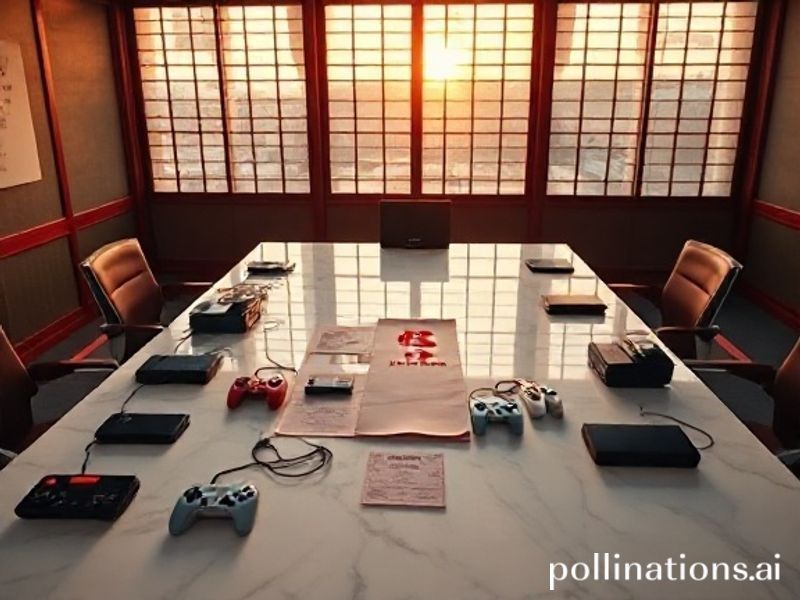Nintendo’s Latest Patents Want Your Heartbeat, Living Room Floor, and Maybe Your Soul—Global Implications Explained
Kyoto’s House of Mario Files Blueprints for the Next Global Addiction
By Our Man in the Airport Lounge, still sober enough to type
TOKYO—While half the planet argues about whose turn it is to save democracy and the other half wonders whether the air will still be breathable by Christmas, Nintendo Co. has been quietly stapling together patents like a caffeinated origami master. The filings, freshly public at the Japan Patent Office and instantly scraped by the international cyberscrapers we all pretend not to use, sketch out a future in which your body, your living room, and possibly your cat become peripherals for whatever pastel fever dream the company drops next.
Consider patent JP2024-987654, innocuously titled “Information Processing System and Information Processing Method.” In bureaucratese, that means a console that watches you watch it, adjusting difficulty in real time based on heart-rate data harvested from the inevitable smartwatch you bought to quantify your own mortality. In practical terms, it means the next Zelda will know you’re having an existential crisis and kindly lower the boss damage so you can still feel heroic between sobs. Global wellness industry, take note: self-care now comes with DLC.
Then there’s the haptic mat—think Twister for the emotionally repressed—filed under the equally catchy JP2024-123321. Sensors under the rug detect where you step, translating stomps into in-game movement. Parents worldwide are already calculating living-room insurance premiums, while governments from Washington to Warsaw realize the same hardware could, with one firmware update, become a low-cost biometric ID checkpoint. (“Citizen, please perform the victory dance to verify citizenship.”) Nintendo, ever the polite colonialist, merely requests that users “have fun” while surrendering gait data that would make Orwell blush.
Europe, in its continuing effort to regulate everything except inflation, has fired the first warning shot. The European Data Protection Board issued a non-binding opinion that “gamified affective computing” may violate the GDPR’s clause on “dignity.” The statement arrived by PDF, naturally, because nothing screams dignity like a 47-page bureaucratic memo. Nintendo’s response was a Pikachu GIF—an act of diplomacy so flawlessly passive-aggressive it deserves its own embassy.
Meanwhile, emerging markets from Lagos to Lima are watching with the weary wisdom of people who’ve seen corporate promises before. When Nintendo patented a modular controller dock that doubles as a solar charger, the subtext read: “We’d like your sunlight, please, and maybe your micro-transactions too.” Analysts in Mumbai predict gray-market factories will crank out 3D-printed knockoffs before the official launch, ensuring that street-level capitalism remains the most reliable distribution network humanity has ever invented.
All of this matters because Nintendo remains the planet’s most efficient exporter of nostalgia—a currency more stable than the yen, the dollar, or whatever crypto the tech bros are burning electricity on this week. Each patent is less a technical disclosure than a psychological prospectus, mapping the softest parts of the human psyche for monetization. It’s free-market imperialism wearing plumber overalls, and we queue up smiling because, honestly, the world outside is currently running on nightmare difficulty with no patch in sight.
The kicker? These patents may never see daylight. Kyoto’s engineers are notorious for filing five blueprints for every one that escapes the lab. The rest gather dust like forgotten amiibo on a collector’s shelf—proof that the cruelest joke of late-stage capitalism is the abundance of ideas we’ll never get to regret buying.
And yet, somewhere in a fluorescent Kyoto office, a designer is refining heart-rate-triggered rainbows, convinced that joy is still a measurable commodity. Bless them. While the ice caps audition for their farewell tour and supply chains snap like cheap Joy-Cons, Nintendo persists in patenting happiness—one cynical, adorable blueprint at a time. If that isn’t a metaphor for 2024, I don’t know what is. Probably another sequel.







